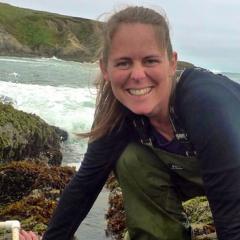Employing science to safeguard marine life with GLORES
Editor's note: This post originally appeared on the Marine Conservation Institute's blog, On the Tide.
Scientists from academic institutions, NGOs, and government agencies huddled in twos and threes over papers, pens, and laptops. While we worked in a windowless room, our minds were in the salty sea. Two old friends studied the regulations and enforcement in Stellwagen Bank National Marine Sanctuary, feeding ground to a myriad of whales, seals, sharks and birds off the eastern coast of the U.S. Two recent acquaintances recorded the size and age of the Great Barrier Reef Marine Park that protects breathtaking corals and the species that call them home along Australia’s northeastern coast. Our task was to test a marine protected area (MPA) evaluation framework – to identify its weaknesses and brainstorm solutions. Our goal is to protect marine biodiversity around the globe.
“Making marine science matter,” was the theme of the 4th International Marine Conservation Congress (IMCC4), held this month in St. Johns, Newfoundland and Labrador, Canada. More than twenty scientists devoted a full day at the end of the conference to make their science matter by developing the evaluation criteria for the Global Ocean Refuge System in a focus group led by Marine Conservation Institute.
Marine Conservation Institute has proposed the Global Ocean Refuge System (GLORES) to address the growing threats to life in sea. It will be a strategic network of strongly protected marine areas awarded designation according to science-based standards. The designation award incentives aim to catalyze meaningful protections for at least 30% of the marine ecosystems in each region of the ocean by 2030. It is an ambitious goal – currently only about 2% of the global ocean is effectively protected – but it is one that reflects the growing scientific consensus that meaningful protection of 30% – 40% of the global ocean is needed to safeguard marine ecosystems [1]. GLORES will rely on the large body of science identifying the attributes of effective MPAs to set the bar for meaningful protections of marine life.
Participants in the GLORES focus group at IMCC4 built on the accomplishments of workshops held last fall in California, U.S.A. and two years ago at IMCC3 in Glasgow, Scotland. We wrestled with challenging aspects of evaluating MPAs: judging MPAs with multiple regulatory zones, identifying appropriate evidence of community engagement in MPA management, and determining the activities compatible with protecting marine life when the impacts of those activities are unclear.
What emerged from our efforts in St. John’s was a commitment to strengthen the GLORES evaluation framework and launch the Global Ocean Refuge System with an online nomination platform, candidate site evaluations, and inaugural GLORES awards as soon as possible. A rapid industrial revolution is underway in the ocean, and we recognize the urgent need to catalyze protections and stem the loss of marine biodiversity. In the coming year we will debut the Global Ocean Refuge System to safeguard marine life now and for future generations.

